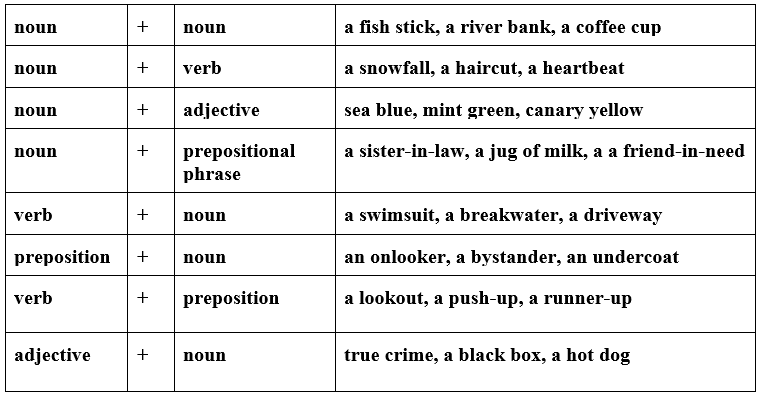A compound noun usually consists of two parts: the first noun indicates what class of things the second one belongs to. The first noun is typically used in the singular form:
a street lamp
a dog food
a landing strip
However, there are several occasions when the first noun can be used in plural.
with the nouns that are always plural:
a clothes shop
a pyjamas party
a glasses rim
when we talk about an institution (a department, an industry):
a sales department
a road materials industry
a concrete components institution
Pay attention to the fact that the second noun becomes plural if we need to use the compound noun in plural:
door bells
garden statues
Types of compound nouns

There are situations when we can’t use the noun+noun structure. In this case, we need to use a noun + ‘s + noun:
when the first noun is the user of the second noun:
the wife’s car, a baby’s rocking horse, a child’s playpen, a girls’ room
when the item described by the second noun is produced by the object described by the first one:
goat’s cheese, cow’s milk, bird’s eggs
when we talk about body parts of people and animals:
a baby’s foot, a woman’s hand, a dog’s nose
Hyphens in compound nouns
A compound noun needs a hyphen when it consists of a verb and an adverb (to show that the adverb is linked with the compound rather than any other elements of the sentence): sign-off, shake-out, stake-out:
You are charged one dollar at the sign-up to check if your credit card can proceed with a transaction.
If a compound noun consists of a verb as the second element and is preceded by a noun consisting of more than one syllable, this compound noun is either hyphenated or presented as two words: cabinet-maker, boiler-maker, cauliflower grower, sheep farmer.
In this case, you will need to check in your dictionary whether a hyphen is needed or not.
I think we need to hire a market-maker to trade our shares in order to launch the product.
Careless drivers are dangerous for all road users.
It’s a challenge for a dairy farmer not to run out of silage.
She’s a truly talented speech-maker.
You should hyphenate expressions in which each element has equal status, and expressions in which the elements rhyme: owner-driver, city-state, philosopher-king, hocus-pocus.
Most individual owner-operators never apply for a policy of insurance.
Some people treat medicine as a hocus-pocus.
A new bar-restaurant has started up at the corner.
If an adjective + noun compound acts as a modifier (used as an adjective), a hyphen is required: middle-class neighborhood, high-quality boots, fire-proof jacket.
We are currently working on building a future-proof PC.
She’s been diagnosed with a low-stage tumor.
You can make high-risk investments only if you are ready to lose your money at any moment.
If a participle + noun or noun + participle compound is used as an adjective, a hyphen is also required: a swimming-suit sale, an English-speaking friend.
There is a running-shoe sale at the mall.
It’s a rocking-chair cushion. I need it to reduce my back pain.
He is a trouble-making type.
Compound nouns that consist of a noun + participle (in any order) are to be hyphenated when they are used as an adjective: a garden-filled city, cutting-edge methods. In other cases, no hyphens are needed.
All drug-tested patients are required to stay in hospital until the results are provided.
All the patients admitted to hospital must be drug tested.
A compound noun that has three or more words may either be hyphenated or not: editor in chief, base on balls, give-and-take, good-for-nothing, know-it-all, justice of the peace, jack-of-all-trades, pick-me-up, stick-to-itiveness.
She is an I-will-never-call-you-back girl.
Your visit was a jack-in-the-box for me.
Every compound noun should either be memorized or checked with a dictionary.